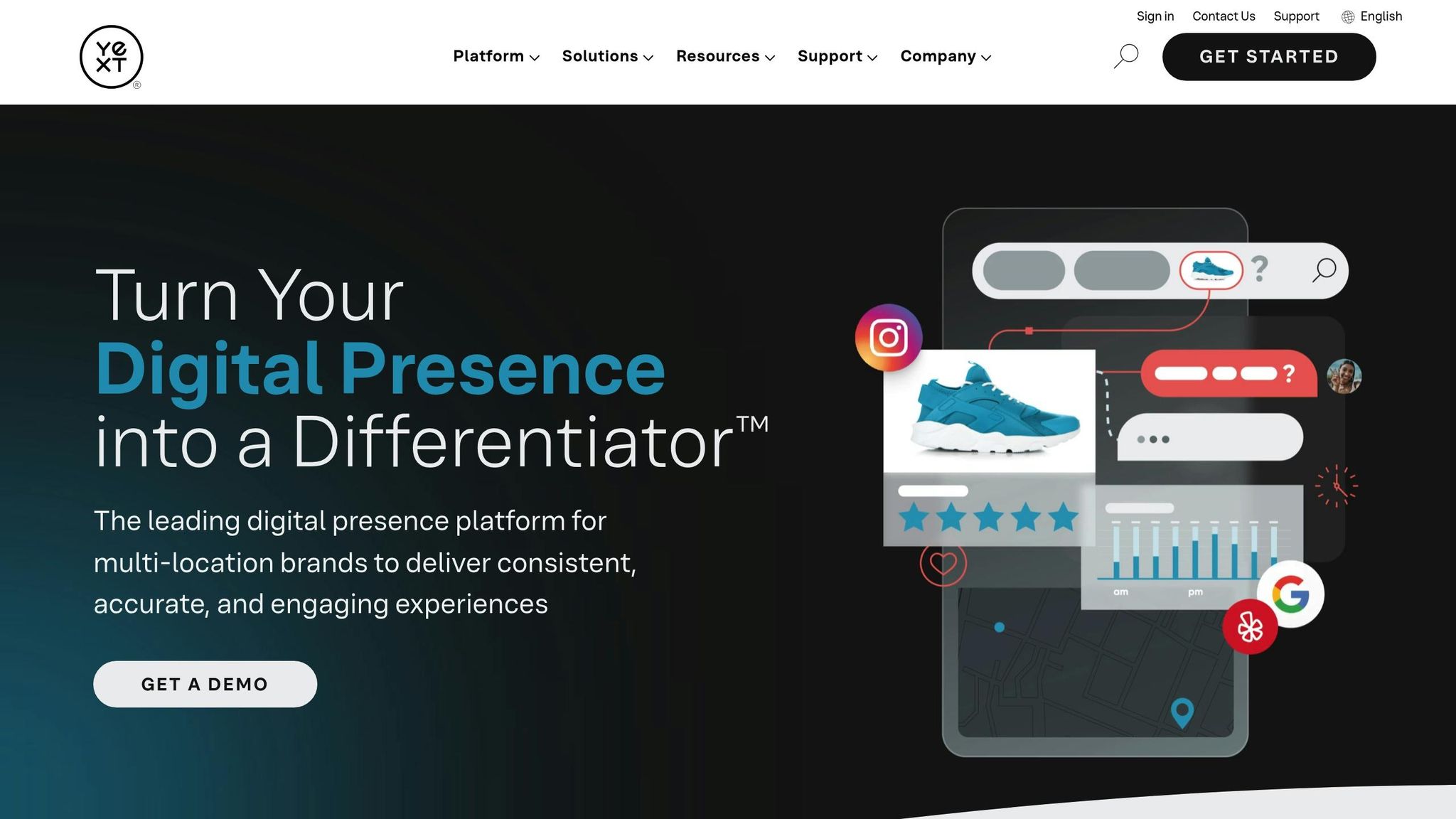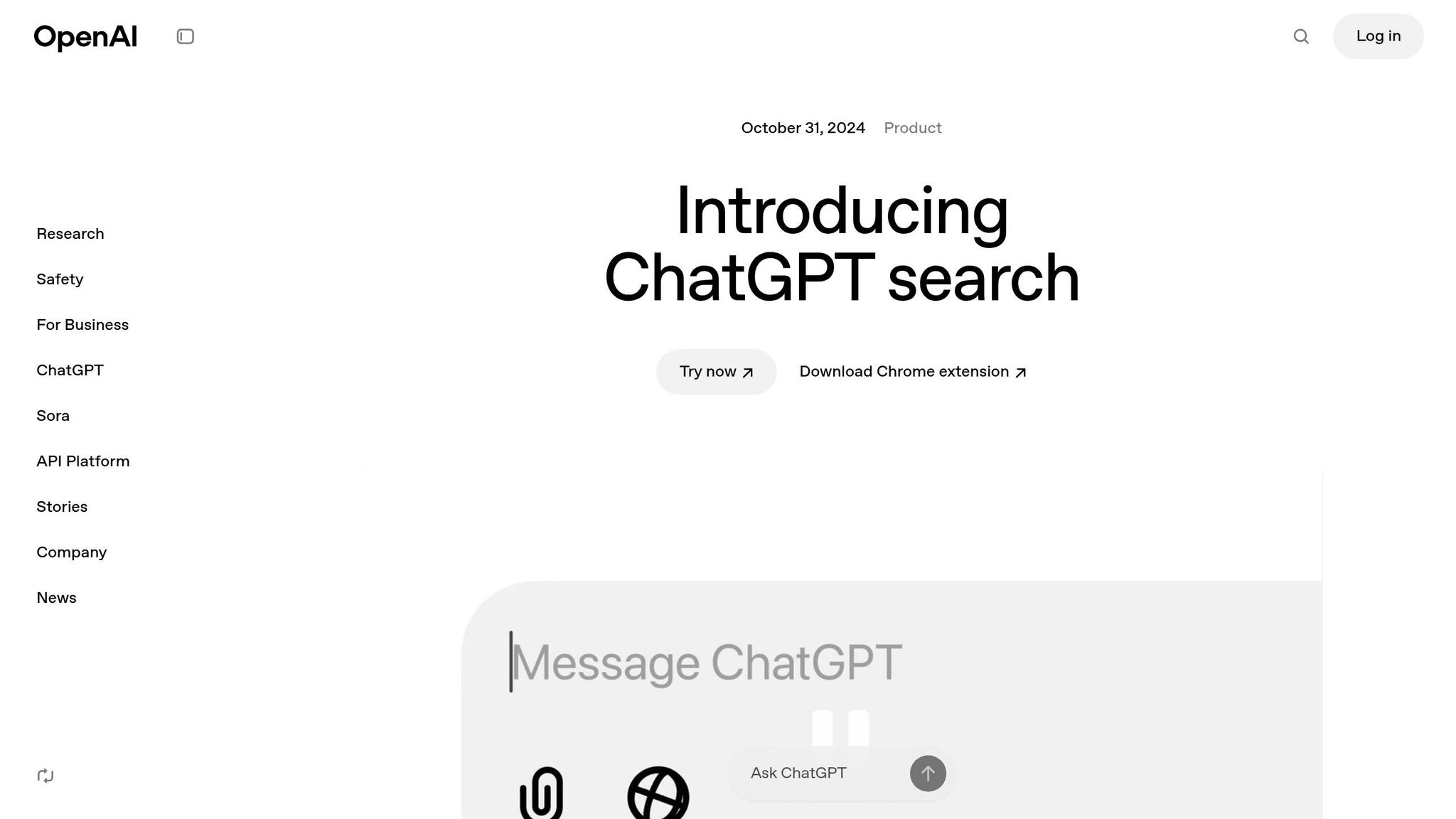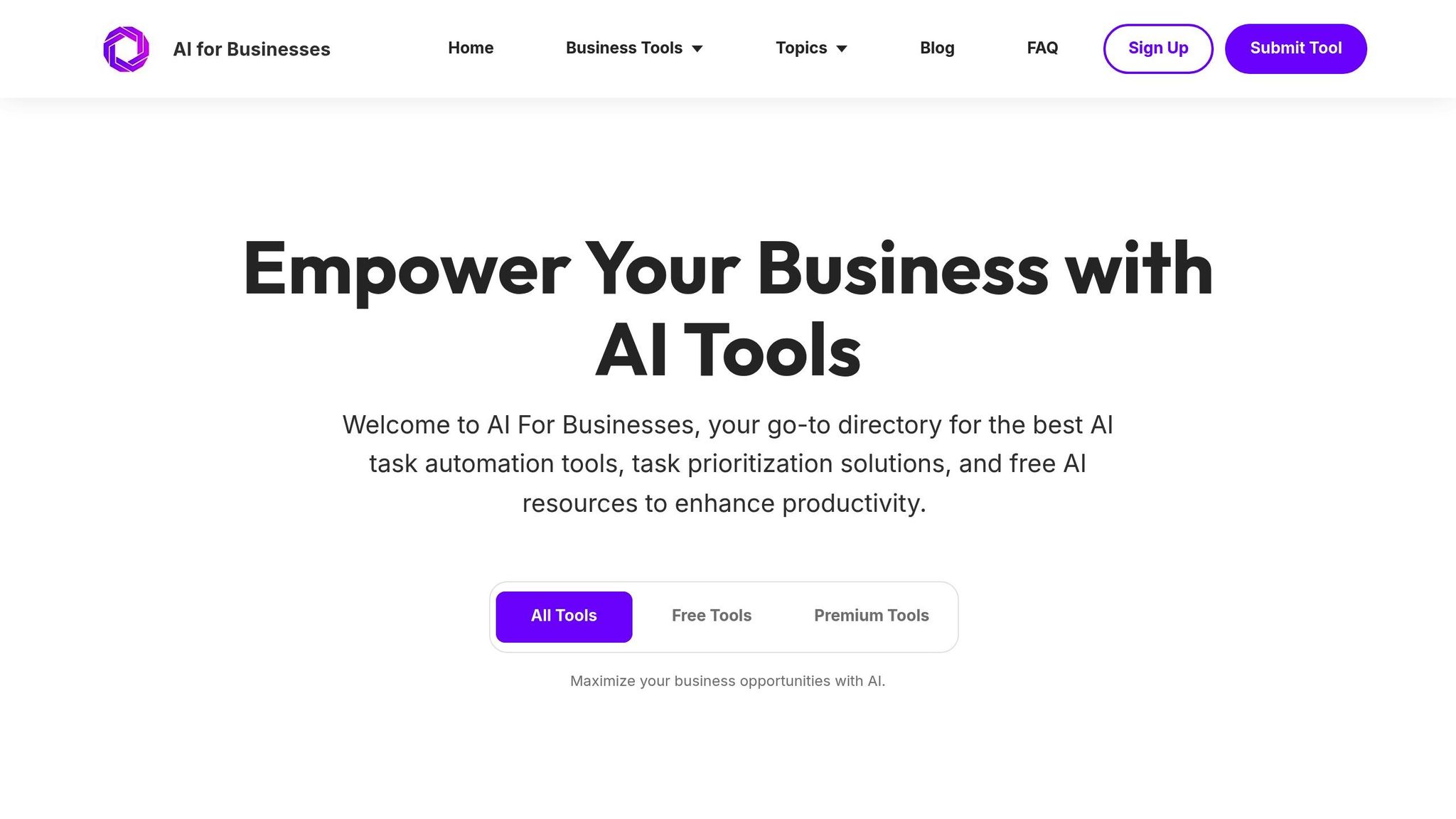Voice search is transforming how people find information, shop, and interact with businesses. With 58.6% of Americans having tried voice search and 21% using it regularly, optimizing for voice queries is no longer optional. AI tools are helping businesses stay visible by aligning content with natural, conversational queries and improving local search results. Key trends include:
- Voice commerce growth: Expected to reach $82 billion by 2025.
- Local impact: 58% of users search for local businesses via voice, and 28% call directly.
- AI tools: Features like natural language processing (NLP), schema markup, and local SEO are critical for success.
Top tools include:
- Yext: Simplifies local business listings and schema markup.
- Shopify Magic: Enhances e-commerce content for voice queries.
- ChatGPT Search: Creates conversational content tailored to voice search.
- AI for Businesses: Offers a directory of tools for SMEs.
Voice search is projected to make up over 50% of all searches by 2025, making it vital for businesses to optimize now. AI tools streamline this process, ensuring businesses meet user expectations for fast, accurate, and conversational results.
How AI and Voice Search Will Get Your Business Found in 2025
Core Features of Voice Search AI Tools
When it comes to AI tools for voice search optimization, having the right features can make all the difference between being heard or getting lost in the noise. As Rob Downey, co-founder of Simply Be Found, aptly states:
"If you're not targeting the right voice search keywords, your business is whispering in a screaming world".
The right tools ensure your business stands out loud and clear. Let’s explore how structured data and natural language processing play a key role in bridging the gap between your content and voice search technology.
Schema Markup and Structured Data
Schema markup acts as a translator, converting your website’s data into a language that search engines - and by extension, voice assistants - can easily understand. This is especially critical given that 40-60% of voice search answers come from featured snippets. Websites using schema markup can see up to a 40% increase in click-through rates, and 72.6% of top-ranking Google pages leverage schema.
By defining your content's structure and meaning, schema markup helps AI-powered search engines identify key information more accurately. The best AI tools make this process seamless by automatically generating schema markup for crucial elements such as:
- Articles
- FAQs
- Products
- Events
- Reviews
- Local business details
These tools also incorporate specialized markups like BreadcrumbList to clarify your site's hierarchy and speakable markup for text-to-speech functionality. To ensure everything runs smoothly, they test structured data with tools like Google’s Rich Results Test, flagging potential errors before they can hurt your voice search performance.
Natural Language Processing for Conversational Queries
Voice search isn’t just about keywords - it’s about understanding how people naturally speak. Voice queries tend to be longer and more conversational compared to text searches. Here’s a quick comparison:
| Aspect | Voice Search Query | Text Search Query |
|---|---|---|
| Query Structure | Longer, conversational, with full sentences | Shorter, keyword-focused phrases |
| Response Format | Provides a single, precise answer | Offers multiple results to explore |
| User Intent | Prioritizes quick, specific answers | Allows broader content exploration |
For example, when someone asks, "What’s the best Italian restaurant around here?", they’re looking for recommendations, reviews, and location details all at once. AI tools equipped with advanced Natural Language Processing (NLP) help businesses align their content with these conversational patterns, ensuring they meet users' expectations for precise, relevant answers.
Local SEO Improvements
Local optimization is a game-changer for voice search. Voice searches are three times more likely to be location-based than text searches. In fact, 58% of people use voice search to find local business information.
Top-tier AI tools simplify local SEO by automatically managing and optimizing Google Business Profiles. They ensure details like business hours, phone numbers, and driving directions are always accurate and up-to-date. These tools also analyze local trends and fine-tune content to answer location-specific questions like, "What time do you open?" or "Is there parking available?"
Additionally, they provide advanced features such as:
- Monitoring local search rankings
- Competitor analysis for location-based queries
- Integration with mapping services to maintain consistent business information across platforms
With these capabilities, businesses can confidently meet the demands of voice search users who expect quick, reliable answers.
Best AI Tools for Voice Search Optimization
Using the right AI tools can significantly improve voice search performance. With voice commerce expected to hit $40 billion by 2026 and 46% of users conducting daily voice searches, selecting the right tools is more important than ever. These tools utilize advanced schema markup, natural language processing, and local optimization techniques to align with proven AI strategies, each catering to specific business needs.
Yext: Local Business Listing Optimization

Yext makes it easy to manage business listings across various directories and search engines, ensuring consistent and accurate information. It automatically generates schema markup, which enables voice assistants to provide precise details like store hours or locations when users ask. Pricing starts at $199 per year for the Emerging plan.
Shopify Magic: E-commerce Voice Search

Shopify Magic is designed to optimize e-commerce content for voice search. It generates conversational product descriptions tailored to queries like "What’s the best wireless headphone for working out?" or "Which laptop works well for graphic design?" The tool also refines product titles and meta descriptions to capture longer, conversational search phrases - essential for voice search optimization. Shopify Magic is included in all Shopify plans, starting at $29 per month.
ChatGPT Search and Conversational AI Platforms

For broader content strategies, conversational AI platforms like ChatGPT Search are invaluable. These tools excel at processing natural, conversational language to create content that directly answers voice queries. They can help businesses build FAQ sections, blog posts, and website copy that address common voice search questions. Additionally, they analyze existing content to identify gaps where voice queries aren’t adequately addressed and generate new content to fill those gaps.
AI for Businesses: Complete AI Tool Directory

AI for Businesses serves as a one-stop directory for small and medium-sized enterprises (SMEs) and growing companies to find AI tools tailored for voice search. The platform features solutions such as Stability.ai for visual content, Writesonic for conversational content, and Looka for maintaining brand consistency. These tools work together to enhance voice search visibility by improving engagement metrics, such as visuals and audio content, which are critical for ranking in voice search results. The Basic plan is free for limited access, while the Pro plan at $29/month offers full access to all tools and priority support.
sbb-itb-bec6a7e
Voice Search AI Tools Comparison
Selecting the right AI tool for voice search optimization hinges on your specific business needs, budget, and technical setup. Data on voice search optimization spending highlights varying budget requirements, making a detailed comparison crucial for smart decision-making.
Feature Comparison Chart
Here’s a breakdown of key features across popular AI tools, showcasing their strengths for different business scenarios:
| Tool | Schema Markup | Conversational AI | Local SEO | Natural Language Processing | Ideal For |
|---|---|---|---|---|---|
| Yext | ✅ Automatic generation | ❌ Limited | ✅ Excellent | ✅ Basic | Local businesses, multi-location companies |
| Shopify Magic | ✅ E-commerce focused | ✅ Product descriptions | ❌ Limited | ✅ Advanced | E-commerce stores, online retailers |
| ChatGPT Search | ❌ Manual implementation | ✅ Excellent | ❌ Limited | ✅ Advanced | Content creation, FAQ development |
| AI for Businesses | ✅ Via integrated tools | ✅ Multiple options | ✅ Via Stability.ai & others | ✅ Via Writesonic & others | SMEs, scale-ups, comprehensive solutions |
This chart highlights the unique advantages of each tool. For example, Yext excels in local SEO with automated schema markup, while ChatGPT Search shines in creating conversational content, though it requires manual schema implementation. Meanwhile, AI for Businesses offers a well-rounded solution with its integrated suite of tools.
Pricing and Business Fit
Beyond features, pricing and business alignment play a significant role in choosing the right tool. Costs vary widely - from smaller investments for local businesses to high-budget implementations for large enterprises.
- Yext: Ideal for local businesses, thanks to its automated schema markup and focus on improving local visibility.
- Shopify Magic: Perfect for e-commerce stores, with advanced conversational AI tailored for product descriptions.
- ChatGPT Search: A great fit for content-heavy businesses, offering tools for optimizing FAQs and blogs.
- AI for Businesses: Particularly beneficial for SMEs and scale-ups, offering an integrated suite of tools at competitive pricing.
For growing SMEs and scale-ups, AI for Businesses stands out with flexible pricing. It offers a free Basic plan for initial testing and a Pro plan at $29 per month, which includes access to tools like Writesonic for conversational content, Stability.ai for visual assets, and Looka for branding. Considering that 53% of businesses spend $50–$300 per page on voice search optimization, this package delivers strong value.
Voice Search Trends and Future Outlook
Voice search is on track to generate over $40 billion in sales by 2025. This rapid growth highlights a major shift in how people in the U.S. interact with technology and search for information.
Current Voice Search Trends
Voice search is evolving, and several key trends are reshaping the digital marketing landscape. By 2025, it’s estimated that voice searches will make up more than 50% of all online searches. This makes it a channel that businesses simply cannot afford to overlook.
One of the biggest changes is hyper-personalization. AI systems now analyze user history and preferences to deliver tailored search results. For businesses, this means moving beyond generic SEO strategies and creating content that aligns with specific user needs and contexts.
Another trend to watch is the rise of voice and visual hybrid results, especially with the growing use of smart display devices. Voice assistants with screens now deliver visual content alongside spoken answers. This requires businesses to optimize for both audio and visual formats, opening up new ways to engage users through multiple sensory experiences.
Real-time data integration is also transforming voice search. Voice assistants now rely on live data to provide up-to-date answers. For local businesses, this means keeping information like hours, availability, and services accurate and current, which enhances local SEO efforts.
The emergence of AI-driven answer-only results is changing the way businesses approach SEO. Voice assistants increasingly provide direct answers without directing users to websites. This makes optimizing for featured snippets more important than ever, as businesses aim to become the go-to source for specific queries.
Multilingual voice queries are becoming more common as voice recognition technology improves across languages and dialects. In a country as diverse as the U.S., this offers businesses the chance to reach audiences who prefer searching in languages other than English.
Voice search behavior is also becoming more complex. Users now ask multi-intent questions that combine location, product details, and availability in a single query. For instance, instead of saying, "pizza near me", users might ask, "What’s the best gluten-free pizza place within 10 minutes that’s open until midnight?".
These trends are reshaping how businesses need to approach their digital marketing strategies.
Action Steps for Businesses
To stay ahead, businesses must adapt now to the growing voice search market. Sarah Berry, Lead Web Marketing Consultant at WebFX, stresses: "Voice search will account for half of all searches... businesses need to research now, and not later, how voice search will impact their digital marketing plan in 2025."
Here’s what businesses can do:
- Create conversational, FAQ-style content: Write in a way that mimics natural speech patterns. Since 32% of consumers use voice daily for searches they’d normally type, replace overly formal, keyword-heavy content with clear, question-and-answer formats. Use headers and bullet points to improve readability and boost your chances of being featured in voice search results.
- Strengthen local SEO with real-time updates: Claim and optimize your Google Business Profile, ensure your business details are always accurate, and encourage customer reviews. Incorporate hyper-local keywords to target neighborhood-specific searches. Voice assistants increasingly rely on live data, so keeping information up-to-date is critical.
- Focus on technical optimization: Use schema markup (such as FAQ, local business, and product schema), prioritize mobile-first design, and ensure your site loads quickly. With 56% of voice searches happening on smartphones, your site must be mobile-friendly and easy to navigate.
- Explore voice commerce opportunities: With 52% of smart speaker owners expressing interest in receiving promotions and deals through voice assistants, businesses should consider voice-activated shopping experiences. This could include offering exclusive deals or creating seamless voice-based purchasing options.
The potential for voice search is enormous. The global voice commerce market is projected to hit $693.0 billion by 2034. Businesses that optimize for voice search now will position themselves to thrive as this technology becomes the dominant way Americans search for and interact with brands.
Summary and Key Points
Optimizing for voice search using AI tools has become a critical strategy for businesses aiming to stay competitive. With 27% of Google searches now conducted via voice - amounting to 1 billion global voice searches every month, businesses that fail to adapt risk falling behind in a rapidly evolving market.
Voice Search AI Tools Overview
The AI tools highlighted in this article cater to a variety of business needs and budgets, making voice search optimization accessible to companies of all sizes. For example:
- Algolia is a standout option for e-commerce businesses, offering lightning-fast response times under 100ms. It has helped brands like Everlane reduce "no results" outcomes by 45%, leading to a 5% increase in conversions. Pricing is usage-based, at $0.50 per 1,000 searches, making it ideal for high-volume operations.
- Klevu is tailored for mid-market retailers. Soak&Sleep’s Ecommerce Director shared how Klevu's natural language processing improved their customer experience, ensuring even complex searches like “super king duvet under 100” yield accurate results.
- Luigi's Box offers flexible pricing, ranging from €79–€999 monthly (approximately $87–$1,099), making it accessible for small businesses and scalable for larger needs.
For businesses seeking a consolidated resource, AI for Businesses provides a directory of tools, simplifying the process of finding the right fit for voice search optimization without the need to individually evaluate each option.
These tools not only help businesses adapt to the growing voice search trend but also allow them to refine their strategies based on their specific goals and customer needs.
Why Voice Search Optimization Matters
Voice search is no longer just a convenience; it’s becoming a cornerstone of how users interact with technology. By 2024, over 50% of U.S. households are expected to use voice-enabled assistants, and 71% of users prefer voice search over typing, especially when multitasking or using mobile devices. This shift in behavior has significant implications for businesses:
- Voice commerce spending is projected to hit $81.8 billion by 2025.
- Mid-market retailers leveraging AI for voice search report an 11% increase in average order values and 12% higher conversion rates.
- Companies like Amazon are already reaping the rewards, generating $5 billion annually from voice-driven sales.
For small and medium-sized businesses (SMEs), voice search offers a chance to compete with larger players. With 58% of consumers using voice search to find local business information, optimizing for conversational, long-tail queries can attract highly targeted traffic.
AI tools enhance voice search by improving accuracy, personalization, and efficiency. As these technologies continue to evolve, businesses that invest now will benefit from ongoing advancements that make search results even more effective.
The takeaway? Voice search is no longer a novelty - it’s becoming essential. With 75% of U.S. households predicted to own a smart speaker by 2025, now is the time for businesses to embrace this shift and position themselves for long-term success in the voice-driven era.
FAQs
How can AI tools like schema markup and natural language processing (NLP) enhance voice search optimization for local businesses?
AI tools like schema markup and natural language processing (NLP) are game-changers when it comes to boosting voice search optimization for local businesses. Schema markup helps structure website data, making it easier for search engines to interpret and showcase the most relevant details in voice search results.
On the other hand, NLP takes things further by analyzing how people naturally speak and ask questions. This allows businesses to fine-tune their content for the conversational, question-driven queries that dominate voice searches. Together, these tools not only help local businesses show up in voice snippets but also increase their visibility and relevance, making it easier to connect with nearby customers.
What should e-commerce businesses look for when choosing AI tools to optimize voice search?
When choosing AI tools for voice search optimization, focus on ones that excel in natural language processing and effectively handle long-tail keywords. These features help align your content with how people naturally speak during voice searches. It's also important to ensure the tools can incorporate structured data, which boosts visibility on search engines, and support local SEO to better connect with nearby customers.
Look for tools that can grow with your business, integrate smoothly with your existing e-commerce platform, and improve the overall user experience. Features like quick performance, mobile-friendly design, and top-notch speech synthesis are key to staying competitive in the expanding voice search market.
How can businesses take full advantage of the growing voice commerce trend?
To get the best out of voice commerce, businesses should start by tailoring their content for voice search. This means using natural, conversational phrases and crafting FAQ-style content that aligns with how people speak. Adding local SEO tactics can also help draw in nearby customers who rely on voice search for local recommendations. Focus on providing simple-to-reorder products - the kind that customers can easily purchase with a quick voice command. Lastly, keep an eye on customer interactions with voice search. Analyzing this data can reveal insights into their preferences and habits, helping you fine-tune your strategy and stay competitive in this expanding market.


